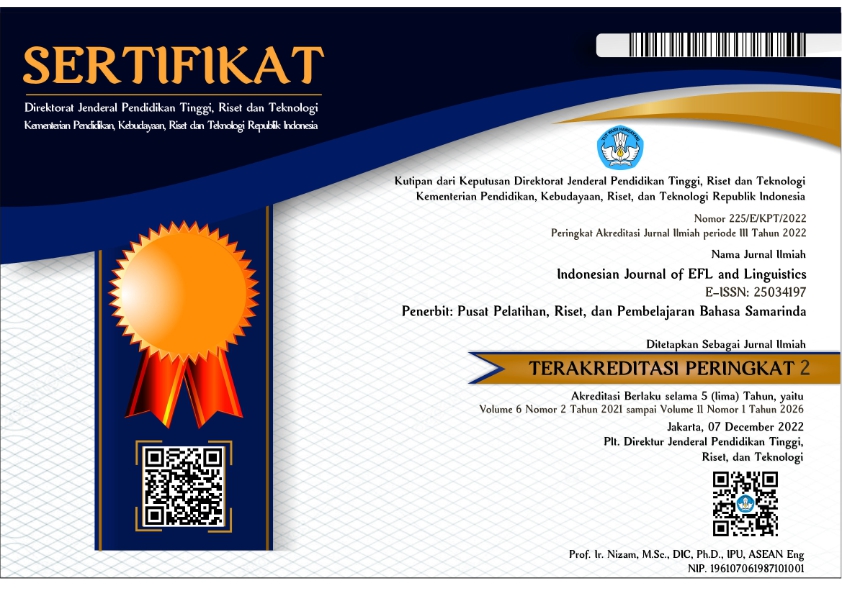Personal Pronouns in American Presidential Political Discourse
Abstract
This research examines first-person personal pronouns which arise in political speeches given by Obama in his victory as American President in 2008 and 2012. Employing qualitative and quantitative methods, this research explores the occurrences of first personal pronouns to reveal the forms and its discourse function through political speeches. Abstracting from 458 personal pronouns found in Obama’s speeches, 272 pronouns are identified as first personal pronouns. The findings of the first personal pronouns employed in Obama speeches illustrated that Obama produced pronoun we and its variants, 183 times, and pronoun I and its variants, 89 times. Obama exploited singular personal pronoun to convey personally his deep appreciation and gratefulness, personal experiences, personal professional experiences, his personal argumentative opinions, hopes, and his commitment as well. The use of inclusive we and its variants indicate Obama’s desire to shares responsibility and construct nationalistic spirit, togetherness, equality, publicly assertion about the political situation, and any challenges they probably face in the future. Additionally, by employing exclusive we, Obama asserts his political plans, commitment, political experiences during the election, and serious concern of reconciliation.
References
Ali, M. K., Christoper, A. A., & Nordin, M. Z. F. B. (2017). Pronouns and Ideology in Newspaper Discourse. International Journal of Applied Linguistics & English Literature, 6(3), 168–179. https://doi.org/10.7575/aiac.ijalel.v.6n.3p.168
Alinezhad, H., & Nemati, M. (2019). Divulging Power of Words - Personal Pronouns and Speech Acts. The Journal of Teaching English for Specific and Academic Purposes, 7(2), 211–224. Retrieved from https://doi.org/10.22190/JTESAP1902211A
Beard, A. (2000). The Language of Politics. New York: Routledge.
Bello, U. (2013). “If I Could Make It, You Too Can Make It!†Personal Pronouns in Political Discourse: A CDA of President Jonathan’s Presidential Declaration Speech. International Journal of English Linguistics, 3(6), 84–96. https://doi.org/10.5539/ijel.v3n6p84
Biber, D., Johansson, S., Leech, G., Conrad, S., & Finegan, E. (1999). Longman Grammar of Spoken and Written English. Essex: Pearson Education Limited.
Bramley, N. R. (2001). Pronouns of Politics: The Use of Pronouns in the Construction of ‘Self’ and ‘Other’ in Political Interviews (Thesis: Australian National University). Retrieved from https://digitalcollections.anu.edu.au/bitstream/1885/46225/5/01front.pdf
Brown, R., & Gilman, A. (1960). The Pronouns of Power and Solidarity. In T. A. Sebeok (Ed.), Style in Language (pp. 252–275). Massachusetts: MIT Press.
Dahnilsyah, D. (2017). The Implied Power through the Use of Personal Pronouns in Obama’s Speeches: Critical Discourse Analysis. International Journal of Educational Best Practices, 1(2), 59–71. https://doi.org/10.31258/ijebp.v1n2.p59-71
Dou, X. (2019). Modal Operators and Personal Pronouns in Roosevelt’s Inaugural Addresses. Theory and Practice in Language Studies, 9(8), 984–989. https://doi.org/10.17507/tpls.0908.14
Fina, A. D. (1995). Pronominal Choice, Identity, and Solidarity in Political Discourse. Interdiciplinary Journal for the Study Discourse, 15(3), 379–410. https://doi.org/10.1515/text.1.1995.15.3.379
Greenbaum, S., & Nelson, G. (2002). An Introduction to English Grammar. London: Pearson Education.
Håkansson, J. (2012). The Use of Personal Pronouns in Political Speeches: A Comparative Study of the Pronominal Choices of Two American Presidents (Lecture notes). Linnaeus University, School of Language and Literature, Småland, Sweden. Retrieved from https://semanticscholar.org/paper/The-use-of-personal-pronouns-in-political-speeches-Håkansson/044a71156a339cdf818817e0b9634ebcf389077
Hasan, J. M. (2013). A Linguistic Analysis of in-group and out-group Pronouns in Hosni Mubarak’s Speech. Journal of Basrah Researches, 38(2), 5–24. Retrieved from https://www.iasj.net/iasj?func=fulltext&aId=90135
Ho, V. (2013). Strategic Use of Nouns and Pronouns in Public Discourse: The Case of the Fine-tuning of the Medium of Instruction Policy in Hong Kong. Pragmatics, 23(1), 51–67. https://doi.org/10.1075/prag.23.1.03ho
Huddleston, R. P. G. (2005). A Student’s Introduction to English grammar. Cambridge: Cambridge University Press.
Kaewrungruang, K., & Yaoharee, O. (2018). The Use of Personal Pronoun in Political Discourse: A Case Study of the Final 2016 United States Presidential Election Debate. Reflections, 25(1), 85–96. Retrieved from http://so05.tci-thaijo.org/index.php/reflections/article/view/136268/101678
Karapetjana, I. (2011). Pronominal Choice in Political Interviews. Baltic Journal of English Language, Literature and Culture, 1(1), 36–45. Retrieved from https://dspace.lu.lv/dspace/handle/7/1157
Lenard, D. B. (2016). Gender Differences in the Personal Pronouns Usage on the Corpus of Congressional Speeches. Journal of Research Design and Statistics in Linguistics and Communication Science, 3(2), 161–188. https://doi.org/10.1558/jrds.30111
Proctor, K., & Su, L. I. (2011). The 1st Person Plural in Political Discourse - American Politicians in Interviews and in a Debate. Journal of Pragmatics, 43(13), 3251–3266. https://doi.org/10.1016/j.pragma.2011.06.010
Ranjha, M. I., & Islam, M. (2018). Association vs Disassociation: An Analysis of Inclusive and Exclusive Plural Personal Pronouns in the Pakistani Parliamentary Speeches. Bulletin of Education and Research, 40(2), 195–205. Retrieved from https://researchgate.net/publication/331589393_Association_vs_disassociation_an_analysis_of_inclusive_and _exclusive_plural_pp_in_the_PPS_196/link/5c822f06299bf1268d44c0c4
Saj, H. E. (2012). Discourse Analysis: Personal Pronouns in Oprah Winfrey Hosting Queen Rania of Jordan. International Journal of Social Science and Humanity, 2(6), 529–532. https://doi.org/10.7763/ijssh.2012.v2.163
Wilson, J. (2015). Political Discourse. In D. Tannen, D., Hamilton, H. E., & Schiffrin (Ed.), The Handbook of Discourse Abalysis Volume 1 (pp. 775–794). West Sussex: Wiley Blackwell.




